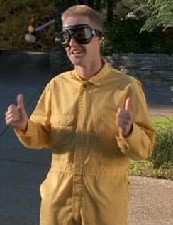Whose Theocracy?
My favorite blogger, Ross Douthat has another excellent post that I want to elaborate on.
There is no such thing as neutrality in belief systems. Everyone has one. The question is NOT whether some belief system is going to guide our political system. The real question is WHOSE belief system.
Whose Theocracy?: I know I harp on this, but maybe someone can explain to me the working definition of "theocracy" - the definition that Kevin Phillips uses; or Andrew Sullivan; or, more moderately, Amy Sullivan, for whom George W. Bush isn't a theocrat, but of course Sam Brownback is. The word used to mean a government-by-priests or religious leaders, which is a pretty far cry from the religious right's agenda - unless, as Ramesh Ponnuru has noted, you think that having prayer in schools and laws against abortion is the equivalent of having the mullahs in charge, in which case 1950s America was a theocratic state. But I don't think the people who toss the word around these days think that, so instead they must think a theocracy means . . . what? A society in which politicians and their proposed political reforms are motivated by religious beliefs? Yes?I'm going to go a bit futher in my criticism of the term "Theocrat". The biggest problem I have with the term "Theocrat" is that those who tend to use it assume that one can be neutral in their stance regarding church and state relations. Everyone brings some sort of belief system into all political discussions. The most virulent atheists or agnostics seek to impose their belief system via politics. Those most opposed to "Theocrats" are guilty of the very thing that they accuse Christians of: imposing their belief system on others.
I can't imagine that anyone has thought this through, because it's a definition so sweeping as to be meaningless. It makes a theocrat out of a religious leader who pressures legislators on any issue - illegal immigration, say, or perhaps the death penalty. Sister Helen Prejean becomes a theocrat. So does Martin Luther King and much of the civil rights movement. A sizable chunk of the Progressives are theocrats, as are many anti-war protestors from the Sixties (the Berrigan brothers being only the most obvious example). Jim Wallis? Theocrat. All those post-World War II European leaders who drew on Catholic social teaching in building up their welfare states? Definitely theocrats. And so forth. The idea that democratic politics shouldn't be influenced by religious beliefs is . . . well, ahistorical, to say the least.
All of which suggests that "theocrat" is now just a term for "a religious person whose political views I dislike." But I'm open to alternative interpretations.
There is no such thing as neutrality in belief systems. Everyone has one. The question is NOT whether some belief system is going to guide our political system. The real question is WHOSE belief system.










<< Back to Dignan's 75 Year Plan